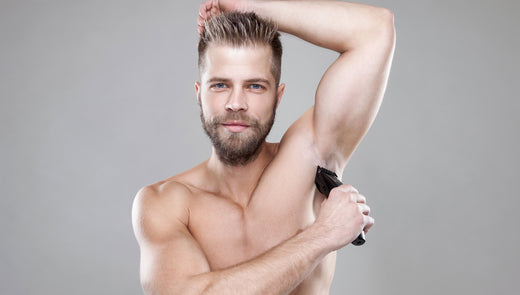Your Cart is Empty

Sweat is something that happens naturally. We all experience a bead of sweat on our brow or in our armpits following a good workout… or on a hot day. But if you experience heavy sweating every day, it can disrupt your daily routine and even cause embarrassment. You want to know what causes sweating and more importantly, how you can stop it.
Whether you find yourself sweating profusely on hot days or tend to stress sweat when you are under pressure, you might find yourself asking, "Why do we sweat?" Here we answer the common questions about sweat and offer some interesting facts that might make you feel a little less embarrassed by this normal bodily function.
This post was originally published in March 2020, and was updated in April 2021.

Sweat is the watery substance produced when your body begins to overheat. It is your body’s natural process to control its temperature. As sweat evaporates, your body cools down which keeps your body temperature normal.
There are two types of glands that produce sweat:
First off, you should know why humans sweat at all. Sweating is a normal body function that happens for one very specific reason: to cool down your body’s internal temperature. When your body temperature gets too high, your nervous system instructs the glands to release sweat to cool down your body.
People sweat for different reasons. For example, you might feel extremely uncomfortable and sweaty in a room you find hot, while others in the room are completely composed and cool. You might tend to sweat when you are nervous, while others might sweat when they are angry, or only when hot or active. This can make asking the question "Why do we sweat?" a little harder to answer. However, there are some common reasons people sweat including:
There are also many medical conditions that can cause overactive sweating, or hyperhidrosis. If you feel you are sweating an abnormal amount, you should speak to your doctor.

Since we all sweat, it can be hard to determine if your sweating symptoms are “abnormal.” However, if you suffer from any of the following physical symptoms, chances are you could have hyperhidrosis:
If you have any of these symptoms, you should visit your doctor to rule out medical issues and to discuss treatments to help manage your excess sweating.
Each person has a different threshold that leads to sweating. It is mostly caused by genetics, but other factors that can cause you to sweat more than most people include:
When you are sweating uncomfortably more than “normal,” speak to your doctor to discuss possible causes.
In general, sweating a lot is not necessarily a bad thing. Each person sweats for different reasons and in varying “volumes.” Therefore, what might seem like excess sweat to one person, could be perfectly normal for another. Sweating as a health indicator is misleading. However, because excess sweating is often caused by an underlying medical condition, you should consult a doctor if it persists. Your doctor can help find the possible causes and offer solutions for treatment.
Most people know their usual sweating habits and the typical amount of sweat they produce in certain situations. However, you may be sweating too much if you encounter these types of scenarios:
If you experience one or more of these changes to your normal sweat habits, then you may suffer from excessive sweating or hyperhidrosis.
Since excessive sweating may be an indication that something else is going on below the surface, you may wish to talk to your doctor about your symptoms. While there is no known cure for excessive sweating, there are medical treatment options to help manage it. Depending on your symptoms, your doctor may suggest treatments like prescription-strength antiperspirants, oral medication, Botox, among others.
If you’re not ready to speak to your doctor, there are other ways to manage your excessive sweating. Here are some of our recommendations:

With the advent of the neighborhood coffeehouse, more and more people drink coffee in some form throughout the day. Whether you prefer a latte in the morning or a shot of espresso in the afternoon, coffee drinks give us the energy to get going – and keep going – throughout our busy lives.
To give you this boost, coffee and other forms of caffeine stimulate your nervous system by triggering a rush of adrenaline. This rush of adrenaline sends your body into “fight or flight” mode: your pupils dilate, your heart rate increases, and your palms and armpits get clammy. So, does coffee make you sweat? Definitely.
Your physical state is tied very closely to your emotional state. For example, when you are depressed, you feel tired and find it hard to concentrate. When you feel anxious or stressed, your body temperature goes up, signaling your body to kick up the sweat production. Sadly, when you already suffer from excessive sweating, you often experience anxiety about sweating in public… which causes a vicious cycle of stress sweat.
A slight increase in body temperature when you eat is a normal reaction.
A slight increase in body temperature when you eat is a normal reaction. This happens because food turns into energy or heat when it breaks down. Specific foods can cause sweating more rapidly than others, even in small amounts. Garlic is one of the foods that has a higher thermic effect. While garlic has many health benefits, it also has a high volume of vitamin B, which naturally raises the body’s temperature. This, in turn, can cause you to sweat more than you normally would after eating a dish containing garlic.
Summer days can get quite hot. However, they can get much worse if humidity enters the picture. With all that moisture in the air, you may wonder if humidity makes you sweat. Not exactly, but it certainly feels that way. On a hot and humid day, your body starts it’s cooling off process by sweating. When humidity is in the air, sweat has a much harder time evaporating, which means it has nowhere to go. So, it sticks to your skin and tricks your body into producing more sweat because it doesn’t cool off properly.
In all honesty, the answer is not black-and-white. Some soft drinks may cause you to sweat more while others may not. As mentioned earlier, caffeine raises your body temperature, which can increase sweat production. So, if you drink a caffeinated soda, you may experience a boost in energy and sweat.
Additionally, if you reach for a non-diet soda, the sugar in it may cause your body to make more insulin than it needs. When this happens your blood sugar decreases, which can cause sweating (among other symptoms).
A sweaty head is one of the symptoms of a vitamin D deficiency.
It is not obvious that anyone has ever broken into a sweat because they were consuming a healthy regime of vitamin supplements. However, as mentioned earlier, vitamin B increases your internal body temperature, which can cause your body to sweat. You may experience an upswing in sweat if you overindulge in foods rich in vitamin B.
More often than not, a vitamin deficiency will likely cause excessive sweating. For example, a sweaty head is one of the symptoms of a vitamin D deficiency. And night sweats are a symptom of a vitamin B12 deficiency.
It may take some time to learn what makes you sweat. Unfortunately, there is not one solution for everyone since no one sweats for the same reasons or even in the same places.
While you’re figuring out the best ways to combat your sweat, check out our collection of sweat proof, odor-fighting basics. (Buy from our shop or on Amazon.) With an Ejis sweat proof undershirt or pair of sweat proof boxer briefs, you can stop the sweat from reaching your clothes and experience what we like to call “wearable confidence.”


